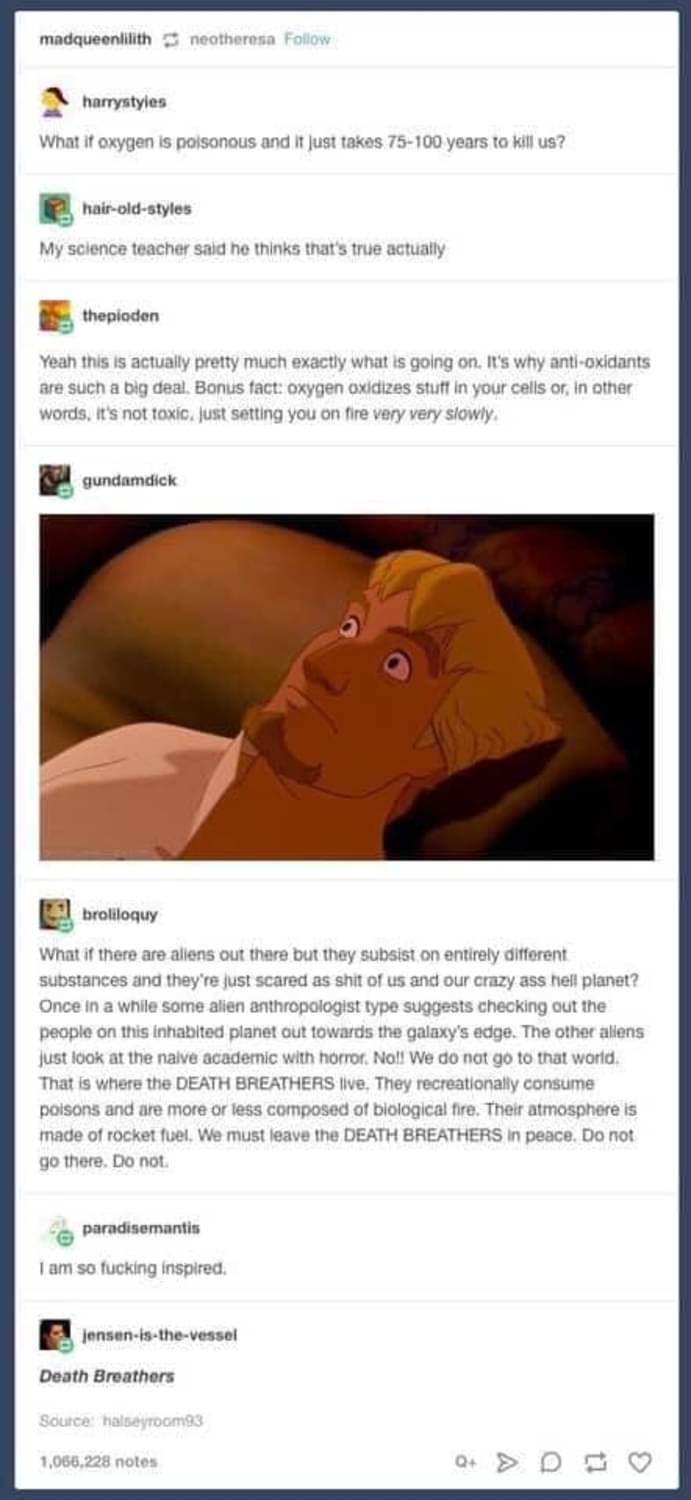this post was submitted on 17 Sep 2024
953 points (97.2% liked)
Science Memes
11161 readers
2999 users here now
Welcome to c/science_memes @ Mander.xyz!
A place for majestic STEMLORD peacocking, as well as memes about the realities of working in a lab.

Rules
- Don't throw mud. Behave like an intellectual and remember the human.
- Keep it rooted (on topic).
- No spam.
- Infographics welcome, get schooled.
This is a science community. We use the Dawkins definition of meme.
Research Committee
Other Mander Communities
Science and Research
Biology and Life Sciences
- !abiogenesis@mander.xyz
- !animal-behavior@mander.xyz
- !anthropology@mander.xyz
- !arachnology@mander.xyz
- !balconygardening@slrpnk.net
- !biodiversity@mander.xyz
- !biology@mander.xyz
- !biophysics@mander.xyz
- !botany@mander.xyz
- !ecology@mander.xyz
- !entomology@mander.xyz
- !fermentation@mander.xyz
- !herpetology@mander.xyz
- !houseplants@mander.xyz
- !medicine@mander.xyz
- !microscopy@mander.xyz
- !mycology@mander.xyz
- !nudibranchs@mander.xyz
- !nutrition@mander.xyz
- !palaeoecology@mander.xyz
- !palaeontology@mander.xyz
- !photosynthesis@mander.xyz
- !plantid@mander.xyz
- !plants@mander.xyz
- !reptiles and amphibians@mander.xyz
Physical Sciences
- !astronomy@mander.xyz
- !chemistry@mander.xyz
- !earthscience@mander.xyz
- !geography@mander.xyz
- !geospatial@mander.xyz
- !nuclear@mander.xyz
- !physics@mander.xyz
- !quantum-computing@mander.xyz
- !spectroscopy@mander.xyz
Humanities and Social Sciences
Practical and Applied Sciences
- !exercise-and sports-science@mander.xyz
- !gardening@mander.xyz
- !self sufficiency@mander.xyz
- !soilscience@slrpnk.net
- !terrariums@mander.xyz
- !timelapse@mander.xyz
Memes
Miscellaneous
founded 2 years ago
MODERATORS
you are viewing a single comment's thread
view the rest of the comments
view the rest of the comments

When we and other known organisms take energy from food we are actually taking molecules with higher-energy electrons, converting them into the high-energy molecules our cellular processes can use to do make cell things happen, and producing very similar molecules with lower-energy electrons. Rather than infinitely accumulating these molecules, our cells dump low-energy electrons onto another molecule that is amenable and thereby convert into a molecule ready to accept high-energy molecules from food (with a bunch of steps in between).
For us, as aerobes, the electron acceptor at the end of respiration is oxygen.
Oxygen as an electron receptor is newer than several others. Anaerobes came first. It was only after photosynthesis had produced a ton of atmospheric oxygen that it became a viable option, really. But it O2 is a comparatively good electron acceptor because the process in which it accepts those electrons allows cells to grab quite a bit of energy from that last step. It is fairly "electron needy" compared to earlier electron acceptors.
So, basically, aerobes get more energy per food unit (sugar molecule) than the vast majority of other creatures. You need it to live because it is an essential part of how your cells get food, namely, how it can recycle molecules at the last step of the respiration cycle.